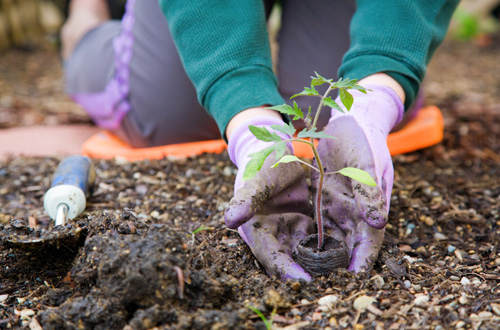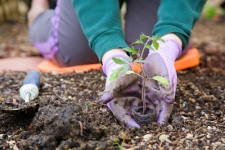
One of the biggest things you can do to keep your hands and wrists safe while gardening is to use common sense! For instance, make sure to always wear gloves when working outside. Wearing gloves helps to reduce blistering as well as to protect your hands from any chemicals, bacteria, and/or fungus that might be hanging out in the soil. This might seem silly, but even a small cut (hangnail, anyone?) can let in large amounts of bacteria which, in turn, can cause a major infection. Gloves can help ward off sunburn and fingernail damage, and ones made of leather offer the best protection from sharp objects, bites, and stings.
Also, be on the lookout for sharp debris buried in the soil – shards of metal or glass (as well as a whole host of other things) can cause punctures or tendon lacerations. So, instead of digging with your hands, make sure to use a shovel, rake, or spade instead. Tools are made for a reason – just make sure you’re using the right tool for the right job.
When it comes to gardening tools, make sure to avoid ones with form fitting handles. Molded finger grips may seem like a good idea, but unless the tool maker used your hand to create the mold, the tool wasn’t made for you. Individuals with large hands that have fingers that overlap the ridges can develop calluses and pain, and those with smaller hands may have to spread their fingers wider than what’s comfortable just to adapt to the grip. Strength testing has shown that spreading fingers reduces grip strength by a significant amount which, in turn, requires more pressure to maintain control.
Another thing to think about when you’re in the garden is whether or not you’re using proper ergonomics. This not only means “watch your posture”, but to also be aware of things like the angle of your wrists when using hand tools. You’ll also want to make sure that you’re avoiding prolonged durations of repetitive motion. Repetitive motions like raking, pruning, digging, and planting can cause tendon, nerve, and skin irritation. To avoid these issues, make sure that your activities in the garden allow for brief rest periods and that you’re changing up whatever it is that you’re doing every 15-20 minutes – this will allow for the same muscles to not be used over and over again.
We want to make sure that you’re enjoying every minute of your time in the garden this spring, summer and fall! However, if you discover that you’re having pain in your hands, wrists, elbows, or shoulders – be it from gardening or something else – please don’t hesitate to give us a call! The physicians and physical therapists here at Prairie Orthopaedic in Lincoln, Nebraska, specialize in issues involving the upper extremity and are here to help you get back to doing the things you love…pain free!
source: assh.org

